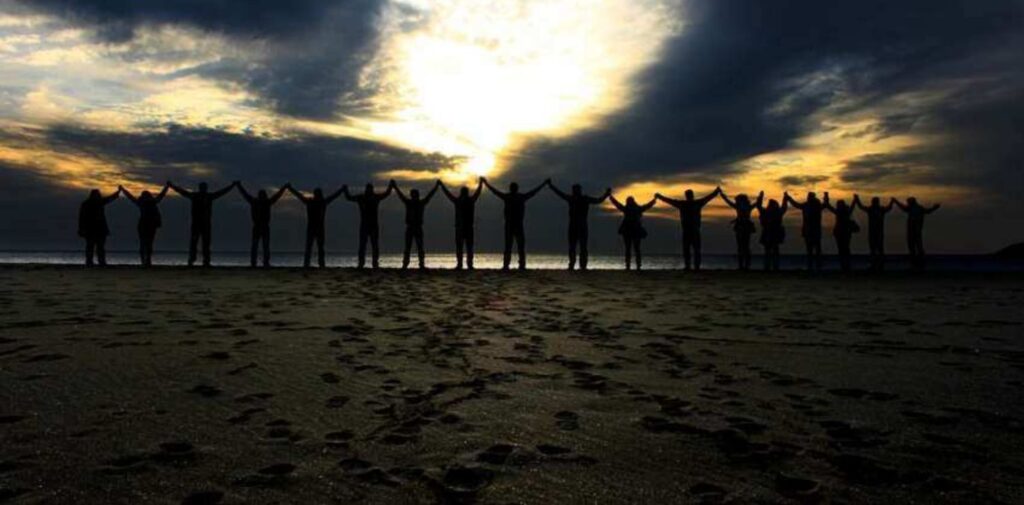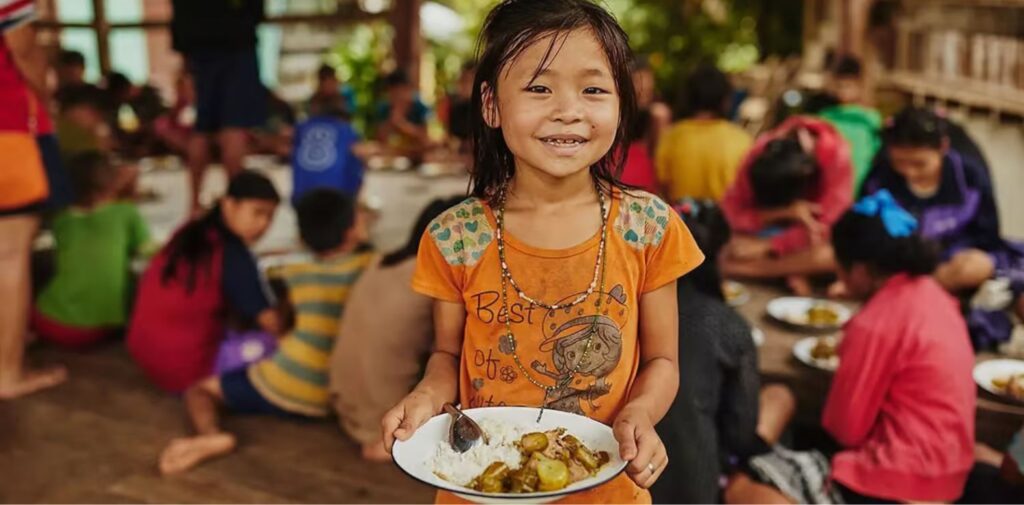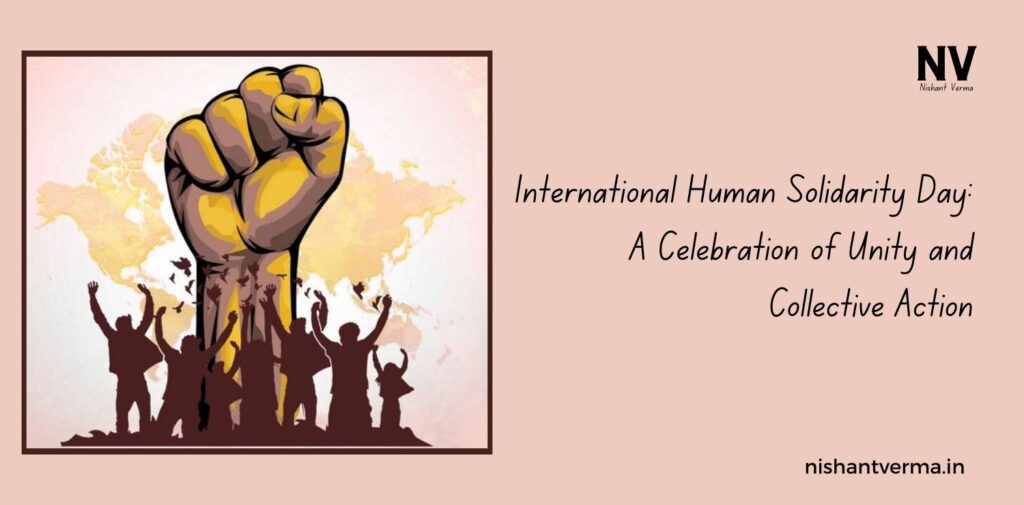International Human Solidarity Day is observed every year on December 20th, a day dedicated to promoting the values of solidarity, unity, and collective action across the globe. The day emphasizes the importance of standing together, helping those in need, and fostering cooperation to tackle global challenges. For India, a country that is diverse and multicultural, the significance of solidarity is particularly relevant, given its rich history of collective action and the spirit of community.
What is Solidarity?
Solidarity means standing together in unity, especially when faced with difficult circumstances. It is about understanding and supporting each other, especially when someone is going through a tough time. In the context of human solidarity, it refers to people from different parts of the world coming together to promote peace, equality, and social justice. Solidarity can take many forms, such as helping those in need, sharing resources, standing up against injustice, and working together to solve global issues like poverty, hunger, and climate change.
The Importance of Human Solidarity
Human Solidarity is vital for creating a peaceful and just world. In a world where division, inequality, and conflict often lead to suffering, solidarity is a powerful tool for bringing people together. It allows individuals, communities, and nations to support one another, address common challenges, and build a sense of shared responsibility. For countries like India, solidarity is deeply rooted in cultural values and traditions that emphasize cooperation, mutual respect, and helping others.
India is a land of diverse cultures, languages, religions, and ethnicities. Despite these differences, the people of India have always come together during times of crisis to help each other. Whether it’s a natural disaster, economic challenges, or social issues, the Indian spirit of solidarity is seen in how people of all backgrounds unite for a common cause.

The History of International Human Solidarity Day
The United Nations (UN) declared December 20th as International Human Solidarity Day in 2005. The decision to dedicate this day was made to raise awareness about the importance of solidarity in achieving global goals, particularly in reducing poverty and promoting sustainable development. The day serves as a reminder that global challenges, such as inequality, climate change, and poverty, can only be solved when people come together to support each other.
One of the key purposes of this day is to promote the idea that solidarity is essential in the fight against poverty. The UN’s Millennium Development Goals (MDGs) and later, the Sustainable Development Goals (SDGs), are based on the principle of solidarity. These global goals emphasize the need for international cooperation to ensure that no one is left behind in the pursuit of a better world.
Solidarity in Indian Culture
India has a long history of solidarity, deeply embedded in its culture and traditions. In every region of India, people come together during times of need, offering help, support, and compassion. Whether it’s organizing relief for those affected by natural disasters, providing education to underprivileged children, or helping the elderly, Indians have always believed in collective action for the common good.
One of the most well-known aspects of Indian solidarity is the concept of Seva (selfless service). In Hinduism, Sikhism, Buddhism, and many other Indian religions, the idea of serving others without expecting anything in return is central to spiritual growth. The practice of Seva encourages people to work together for the welfare of society, highlighting the importance of helping those in need.
Another example of solidarity in India is the tradition of joint families. In many parts of India, extended families live together, where members support each other emotionally and financially. This sense of unity, where each member contributes to the well-being of the family, is a model of solidarity.
During times of crisis, such as the devastating floods in Kerala or the floods in Assam, the people of India have consistently come together to provide relief. Volunteers, government agencies, and non-governmental organizations (NGOs) work hand in hand to offer food, shelter, and medical help to those in need. This collective action is a clear example of solidarity, where everyone works together to support those facing adversity.

Solidarity in Action: India’s Role in the Global Community
India plays a crucial role in promoting human solidarity on the global stage. As a developing country, it faces challenges such as poverty, inequality, and climate change, but it also extends a helping hand to other nations in need. India’s contribution to global solidarity is seen in its role in providing humanitarian aid, disaster relief, and development assistance to other countries.
For instance, India has been at the forefront of providing disaster relief during natural calamities around the world. From sending aid to Nepal after the 2015 earthquake to providing assistance to African nations in combating Ebola, India has shown its commitment to global solidarity. The Indian government also contributes significantly to UN peacekeeping missions, helping maintain peace in conflict zones around the world.
India’s commitment to the United Nations’ Sustainable Development Goals (SDGs) is another way the country demonstrates its support for global solidarity. These 17 goals aim to end poverty, protect the planet, and promote peace and prosperity for all. India has made significant progress in areas such as renewable energy, education, healthcare, and poverty alleviation. The country’s efforts to reduce its carbon footprint and address environmental challenges also contribute to global solidarity, as these actions benefit not only India but the entire planet.
Solidarity in the Fight Against Poverty
One of the most pressing issues that International Human Solidarity Day seeks to address is global poverty. Despite significant progress in many areas, millions of people around the world still live in poverty, with limited access to food, clean water, education, and healthcare. Solidarity is crucial in addressing this issue, as it requires the collective effort of governments, NGOs, and individuals to tackle the root causes of poverty and provide support to those who need it most.
In India, poverty remains a major challenge, with millions of people struggling to meet their basic needs. However, India has made significant strides in reducing poverty over the past few decades. The government has launched various social welfare schemes, such as the Pradhan Mantri Jan Dhan Yojana (financial inclusion program), Swachh Bharat Abhiyan (cleanliness drive), and the Mahatma Gandhi National Rural Employment Guarantee Act (providing employment in rural areas), which aim to improve the lives of the poor.
Additionally, many Indian NGOs and social organizations play a crucial role in helping the marginalized sections of society. Organizations like the Akshaya Patra Foundation, Goonj, and Teach for India are working tirelessly to address issues such as hunger, education, and healthcare. These efforts are driven by the spirit of solidarity, as people come together to support the disadvantaged and create opportunities for a better future.

Solidarity in Times of Crisis
India, like the rest of the world, faces numerous challenges such as natural disasters, economic crises, and the ongoing climate emergency. In times of crisis, the true meaning of solidarity shines through. During the COVID-19 pandemic, for example, people across India came together to help those in need. Communities organized food drives, provided medical supplies, and offered emotional support to those struggling with the effects of the pandemic.
Solidarity was also seen in India’s efforts to help other countries during the pandemic. India supplied millions of COVID-19 vaccines to countries in need, including many in Africa, Southeast Asia, and Latin America. This act of kindness demonstrated India’s commitment to global solidarity in fighting the pandemic.
How Can We Promote Solidarity in Our Daily Lives?
While International Human Solidarity Day is a reminder to reflect on the importance of unity, it is essential that solidarity becomes a part of our daily lives. Here are some simple ways we can promote solidarity in India:
- Support Local Communities: Participate in community initiatives, donate to local charities, and volunteer for social causes.
- Promote Inclusivity: Embrace diversity and promote equality, ensuring that everyone, regardless of background, has equal opportunities.
- Be Compassionate: Offer a helping hand to those in need, whether it’s through financial assistance, food, or emotional support.
- Advocate for Change: Raise your voice for social justice, human rights, and equality, ensuring that the marginalized are heard.
- Environmental Responsibility: Stand together to protect the environment by adopting sustainable practices in your daily life.
Conclusion
International Human Solidarity Day is not just a day to remember but a call to action. It reminds us that by standing together, we can overcome challenges and create a better world for future generations. Whether in India or anywhere else, the values of solidarity, kindness, and cooperation are essential to building a peaceful, just, and prosperous world. By practicing these values in our daily lives, we can contribute to making the world a more connected and supportive place for all.




